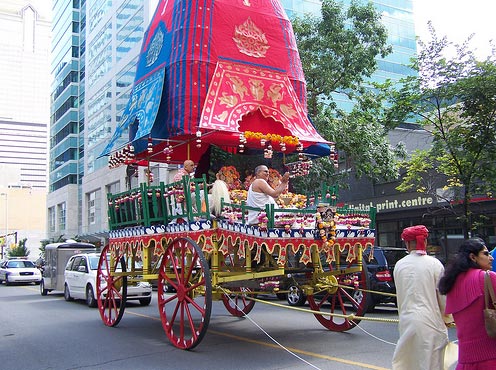Festival of Chariots Fills Calgary with Song, Dance
By Prabhat Mukherjee | Сен 20, 2008

Calgary’s Hindus celebrated the most famous of India’s festivals, the Rath Yatra Festival or Festival of Chariots, on Sept. 6. Celebrated for hundreds of years in India, it one of the oldest celebrations in the world. Millions of people arrive every year to Jagannath Puri, in eastern India, to pull the chariot on which the idols of Lord Jagannath, his brother Balabhadra and his sister Subhadra are seated. This huge cultural-cum-religious celebration is nowadays held in almost all major cities of the world, including Calgary, Montreal, Toronto and Vancouver in Canada.
Calgary’s ISKCON Centre organizes this event every year, and for me and my family, this was to be the first such event we would attend. I and my wife Jayashree reached Stephen Avenue Walk at 1st Street S.E. from where the chariot was to start its journey at 11:30 a.m. Quite a few devotees had already arrived at the site by the time we got there. We saw the huge, colourful chariot with long ropes on both sides to pull it through the streets of downtown Calgary to its destination at Millennium Park on 9th Avenue and 11th Street S.W.
Let me give some background and history of the festival in India before continuing with the Calgary event.
The word “Jagannath” means a deity named “Lord of the Universe” in Sanskrit or Hindi. It is also another name of Lord Krishna in Hindu legends. Rath Yatra consists of two words: rath, meaning a chariot; and yatra which means a procession. The English word “juggernaut” originated from the Jaganath Rath Yatra. History has it that when a British officer first observed Rath Yatra in India in the 18th century, he was so amazed he sent home a description that gave rise to the term juggernaut, meaning “a mammoth force.”
Fa Hien, the Chinese historian who visited India in the 5th century AD, had written about the chariot being pulled along public roads. In Puri, India, the deities — Jagannath, Balabhadra and Subhadra — are worshipped within the famous Jagannath Temple, but on the day of the Rath festival, they are taken through the streets so that everyone can have the opportunity of seeing them. Three richly decorated chariots, resembling temple structures, are pulled through city streets.
This commemorates the annual journey of the three to their aunt’s temple, situated two kilometres from their temple.
This is the only day when devotees who are not allowed into the temple, such as non-Hindus and foreigners, can get a glimpse of the deities.
During the festival, devotees from all over India go to Puri to touch the rope of the chariot, considered a pious deed.
In Calgary, the journey started at noon after a few religious rituals performed by priests. A huge crowd had assembled and everyone wanted to pull the rope, as touching the rope is considered to be most auspicious.
The processions accompanying the chariots played devotional songs accompanied by drums and conch shells. Curious onlookers lined Stephen Avenue taking pictures as the chariot passed by.
The rath cart with its temple structure was made of cloth and had large wheels. It was about eight metres tall and was collapsible. Whenever it would encounter a Plus 15 walkway or a traffic signal pole, it would be brought down temporarily by a hydraulic mechanism. The chariot had even hydraulic brakes.
The colourful chariot, decorated with flowers and applique, was drawn by people of all walks of life who danced and sang.
The whole downtown echoed with “Hare Rama, Hare Krishna” songs, and the sounds of drums and conches that gave testimony to the grand event. The procession ended at Millennium Park at around 1:30 p.m. where the idols were worshipped and fruit was given to the devotees by the priests. Vegetarian meals were also served.
The event continued throughout the day at the park until the last of the entertainment and variety shows concluded at 7 p.m.















